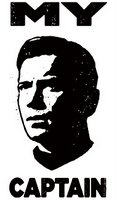 Sourec: New York Times
Sourec: New York TimesFor 10 years, I helped propel the latter-day incarnations of “Trek” into new territory while keeping alive the set of moral principles I’d taken to heart. As I plotted the adventures of the Enterprise-D and the travails of the space station Deep Space 9, I gradually became interested in pushing the boundaries of “Star Trek,” and began to let Captains Picard and Sisko find the shades of gray in a universe Kirk sometimes saw only in black and white.
Science fiction on film and television has, over the past four decades, moved decisively away from the optimism of “Star Trek.” “Blade Runner,” “Alien” and “The Matrix” posit much darker, dystopian futures; even the “Star Wars” movies posit the rise of a galactic empire founded on “the dark side.” Social and commercial explanations abound for this shift, but my theory is that “Star Trek” set the gold standard for the idealistic vision of tomorrow and no one has successfully challenged it.
Nowadays, it may appear that I’ve turned a blind eye to my lodestar as the crew of the battlestar Galactica behave in ways that would’ve been unthinkable in the “Star Trek” universe that Gene Roddenberry created. But “Battlestar Galactica” remains very much informed by the lessons I learned from that slightly paunchy man in the gold pajama top on the good ship Enterprise.
My characters may not have all the answers (sometimes they’re not even aware of the questions) but they contain kernels of both good and evil in their hearts and continue to struggle for salvation and redemption against the darker angels of their natures. Their defeats are many, their victories few, but somehow, some way, they never give up the dream of finding a better tomorrow.
And, thanks to a 40-year-old television show, neither do I.
For the full article visit The New York times
No comments:
Post a Comment